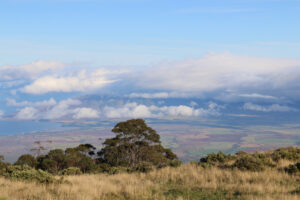The Alexander & Baldwin Sugar Museum is located in former mill manager’s house located next to what was once Hawaii’s largest working sugar factory. The museum, located in the historic plantation town of Puunene, Maui, showcases the history of Hawaiian sugarcane plantations and how the industry shaped the community.
96784
Haleakalā National Park is perhaps the crown jewel of Maui. The 33,265-acre national park is a popular destination for tourists wanting to watch the sunrise on the island, even though clouds often obscure the view. At the center of the park is the dormant Haleakalā (East Maui) Volcano. The volcano last erupted more than 400 years ago, likely between 1480 and 1600 AD.
Hale Pa‘ahao, or stuck-in-irons house, was built in the 1850s as the “new” prison in the port town of Lahaina. The jail saw increasing use during the peak of the whaling era, a time when Lahaina was an important destination.
The lush, stream-cut Iao Valley is located about three miles west of Wailuku. Thanks to its natural environment and history, the valley has become a popular tourist location. It was designated a National Natural Landmark in 1972.
The Old Lahaina Courthouse opened in 1860 and remained in service until the 1970s when the Lahaina Civic Center was built. Architect William D’Esmond restored the courthouse in 1925. Today, the courthouse is home to a museum, art galleries, a visitor center and a community meeting room. Among the artifacts on display is the last Flag of Hawaii to fly over the courthouse.
96761
Pioneer Mill Co. formed in 1860 as the first plantation to grow sugar commercially in Lahaina. A century later, the mill processed 60,000 tons of sugar annually. In 1928, the company built a 225-foot-tall smokestack, which became a landmark for both motorists and boaters. The company transported its cut sugar cane via rail until trucks replaced trains in the 1950s. The company shuttered operations in 1999, but a question remained about how to preserve the landmark smokestack. Lahaina Restoration Foundation took over the $600,000 restoration project. Today, the chimney is part of a small park that includes a pair of locomotives — “Lahaina” and “Launiupoko” — once used on the plantation.
Waiʻanapanapa State Park is a 122-acre state park in Hana, on Maui. It is located at the end of Waiʻanapanapa Road off Hana Highway, 53 miles east of Kahului, Maui. Waiʻanapanapa means “glistening fresh water” in the Hawaiian language, referring to nearby fresh water streams and sparkling pools.
96713

